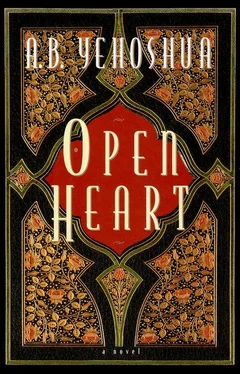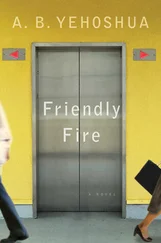She took off her little apron and hung it on the back of a chair, and said with a pleasant smile, “I’m all yours.”
“Then let’s find somewhere quieter,” I said, trying to hint that I wanted to talk to her about something special. She wasn’t surprised by my request, even though the lawn was far from noisy, with people standing and talking quietly, going up to the buffet from time to time to cut themselves additional slices of the delicious pies. At first she led me toward the kibbutz houses, but suddenly she stopped, as if she had thought of a better idea, and retraced her footsteps to the little canyon, where she turned without a word toward the dark side of the cliff, on a mountain path clearly visible between the chalky rocks, yellow in the light of the distant lamps. “Come,” she said in a conspiratorial tone. “If you don’t mind climbing a little, we can sit quietly and look down on everybody at the same time, so that we can see when the ceremony begins.” She wasn’t beautiful in my eyes, but very charming and pleasant. Her slim body was too tall and bony for my taste, and her little face seemed too small for her huge eyes, which shone in the light of the rising moon like two blue lamps. I climbed up after her in silence, surprised by her sudden decision to take me up this rocky, winding mountain path which ascended sharply in the utterly deserted landscape where from time to time we heard the rustle of birds startled from their nests and the beating of wings. “Are Buddhists allowed to marry?” The idiotic question burst out accompanied by a light laugh. “They’re allowed everything,” she replied at once, not surprised by my question. “Buddhism isn’t another vicious religion looking for ways to oppress people and frighten them, but a means of alleviating inevitable suffering.” She spoke seriously, and the expression “inevitable suffering” came out of her mouth sincerely and convincingly, evoking a wave of affection and sympathy for her in my heart. “It’s a pity you couldn’t have stayed for a few more days at least in the temples of Bodhgaya,” she went on. “There you would have understood for yourself what I could never succeed in explaining to you.” And once more I heard in her words a rebuke at my failure to take proper advantage of my unexpected mission to India. “But how could I have stayed there?” I justified myself to her as if I were really to blame. “Mr. Lazar was in such a hurry to get back, and I couldn’t leave Einat, who was in bad shape.”
“Yes, she was in bad shape,” she agreed gently, “and if not for you she wouldn’t have made it back home.” The path now turned sharply back on itself, and suddenly we were standing as if suspended in the air above the glittering blue rectangle of the swimming pool surrounded by the wedding guests. We were actually quite close to them, but completely hidden and secluded, absorbed in the story Michaela had called mine but which was actually Einat’s, and which I had no need to draw out of her, for it flowed from her with the same simplicity and directness with which she spoke about everything, making me feel pleasantly calm and relaxed after months of inner conflict and tension.
She had met Einat with two other Israelis in the street in Calcutta, when Einat, still stunned by the sights, was at the beginning of her trip. Michaela, in contrast, was already an old India hand, after traveling extensively in central India and spending three months in Calcutta, where she had joined volunteer French and Swiss doctors offering free medical services at improvised sidewalk clinics. She had helped these “sidewalk doctors,” as they called themselves, in return for two meals a day and a place to sleep. This was how she had met Einat, on the sidewalk, when Einat came to ask for a dressing for a wound on her leg. Michaela had immediately sensed that Einat was in need of her help, that she was very frightened and upset by her encounter with Calcutta, and perhaps even regretted coming to India. But she also realized that Einat’s panic was something that she shared with all those who sensed that beyond the poverty and ugliness there was a spiritual power that could suck them in, especially those whose sense of identity was tenuous, who felt unable to achieve their ambitions, and who were always quick to look for a way of escape. And indeed, Einat soon persuaded her two friends to escape from Calcutta and go to Nepal in order to immerse themselves in the glorious scenery of the Himalayas. But after two weeks, to Michaela’s astonishment, Einat returned to Calcutta alone and came to look for her. That was how their friendship began. At first Einat worked with Michaela in the service of the “sidewalk doctors,” but she soon abandoned the work and joined some other young people who were traveling to Bodhgaya to take the course on Vipassana meditation, not because she was really interested in Buddhism but because she was one of those people who are more interested in escaping than in seeking. “And you?” I asked Michaela sharply. “Me?” She reflected for a while, trying to answer honestly. “I think that I’m actually more of a seeker than an escapist, but I may be wrong.”
Now I caught sight of my parents. They were standing and talking to the professors from Jerusalem, glancing around from time to time, presumably looking for me. Amnon stood not far from them, gesticulating excitedly as he spoke to two girls we had known in high school, while his little brother lay on the lawn trying to dismantle a sprinkler. Eyal and Hadas were nowhere to be seen; they were probably getting ready for the ceremony. But Eyal’s mother was still sitting where we had found her when we arrived, frozen like a spectacular white statue, a plate of food lying untouched in front of her. Every now and then she raised her eyes to the little crevice where we were sitting, as if she had noticed something. Suddenly low singing rose from a corner of the lawn, where a small group of men and women from the kibbutz were standing holding sheets of music in their hands. “They’re beginning,” said Michaela. “Should we go down?”
“No, why?” I said unwillingly. “If you don’t mind, we can stay and watch the wedding from up here. I’m impatient to hear the rest of your story, especially the part where I come into it. Before you said that Einat was running away, but what from, exactly?”
“What from?” Michaela was surprised at the question. “First of all, from her parents, but maybe from other things too.”
“From her parents?” I repeated in mock surprise, full of curiosity and excitement, hoping to hear something I didn’t know about Lazar and his wife. “In what sense?”
“You should know in what sense,” she broke in quickly. “You spent two weeks in their pockets, didn’t you?”
“You could say so,” I replied calmly, determined to draw her into an attack on them so that I could defend both the woman I loved and her husband. “But they seemed a very nice couple to me, perhaps a little too attached to one another, in an exaggerated, even pathetic way — the wife, for instance, can hardly bear to be separated from her husband, to be on her own even for a little while. But that’s all.”
“That may be all for you,” said Michaela with inexplicable anger, “but it’s evidently too much for someone who has to live with them, like Einat, and be suffocated by that insane symbiosis of theirs. Sometimes I think that if they hadn’t taken you with them to India, they wouldn’t have succeeded in bringing her back alive. She would have died in their arms on the way back home.”
“Died in their arms?” I repeated this dramatic phrase in astonishment, wondering at the profound, if unclear, antagonism toward Lazar and his wife in her words. “You’re exaggerating, Michaela. It isn’t so easy to die, you know.”
Читать дальше












